In North Macedonia, several Russian alternative medicine magazines are sold: “Russian herbalist”, “Russian doctor” and “Russian medicine”. They send messages such as: “Russian advice is worth your health”, “Russians have medicine” and “You ask, Russian doctors answer”. In these magazines, folk medicine is “Russian folk medicine”, and various folk recipes are also “Russian recipes”. But despite the attempt to create an image of a country with excellent health, data from relevant institutions show that Russia has one of the worst statistics in this area, life expectancy there is significantly lower than in developed countries, writes Truthmeter.mk.
Under the syndicating agreement between Truthmeter.mk and Meta.mk, we republish the text below:
Author: Ana Anastasovska
Russia’s influence in the Balkans is significant, and in addition to television and various websites offering content of Russian origin, it is also spread through alternative medicine magazines. Such magazines are sold in our country as well. They come from Serbia, from where they are distributed in neighboring countries, and their main target audience is elderly, which can be seen from the cover photos. These photos mainly show elderly people with grey hair, as well as the choice of topics and ads that are dedicated to ageing-related conditions.
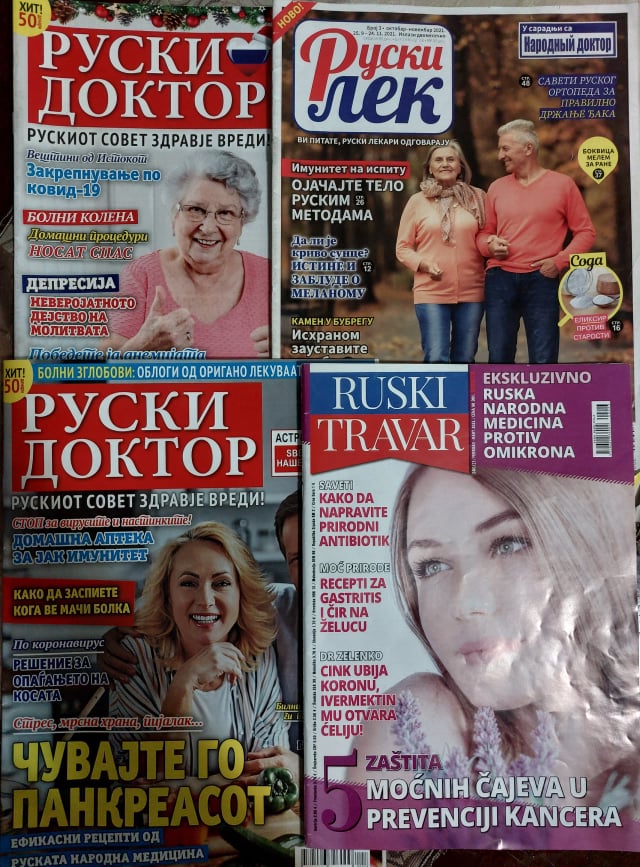
In N. Macedonia, several such Russian magazines are sold – “Russian herbalist”, “Russian doctor” and “Russian medicine”. If you stop in front of any shop, you cannot miss these magazines that increase the visibility of Russian symbols. The graphic design of these magazines involves the use of the colors of the Russian flag or a miniature version of the flag on almost every page. They send messages such as: “Russian advice is worth your health”, “Russians have medicine” and “You ask, Russian doctors answer”.
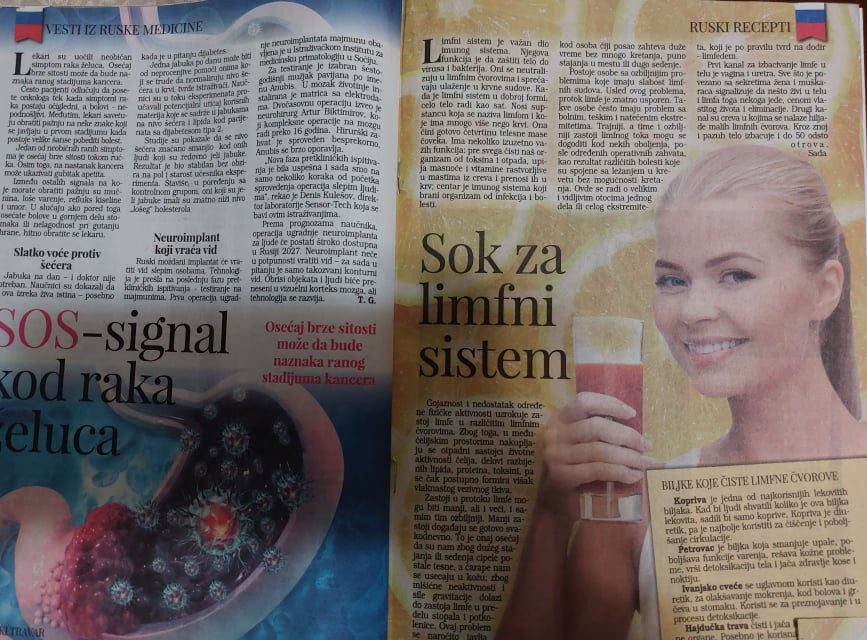
If you go through the magazines you will find that any common health advice – which can be obtained from any doctor in the world – qualifies as “Russian”. Folk medicine is “Russian folk medicine”, and various folk recipes for some diseases are also “Russian recipes”. For example, among the five “powerful teas for cancer prevention”, in the first place is “Russian tea”. In these magazines, you can also find the “Russian elixir” for the prevention of omicron, discovered by Russian scientists, and it consists of inhaling “Russian vodka”. The folk remedy for treating external hemorrhoids with the help of potatoes, which you can find everywhere, is presented here as a “Russian traditional folk recipe”.
The content of these magazines is mainly from Russia and ranges from the advice of doctors, recipes for some dishes, to the promotion of Russian herbalists and spiritual healers, who have found “miraculous” drugs to prolong life, cure cancer, cardiovascular disease, and almost every other disease. Of course, tips on how to fight the coronavirus are not excluded.
In this context, there is a text that conveys the experiences of Dr Vladimir Zelenko, who says that “Zinc kills the corona, and ivermectin opens cells.”
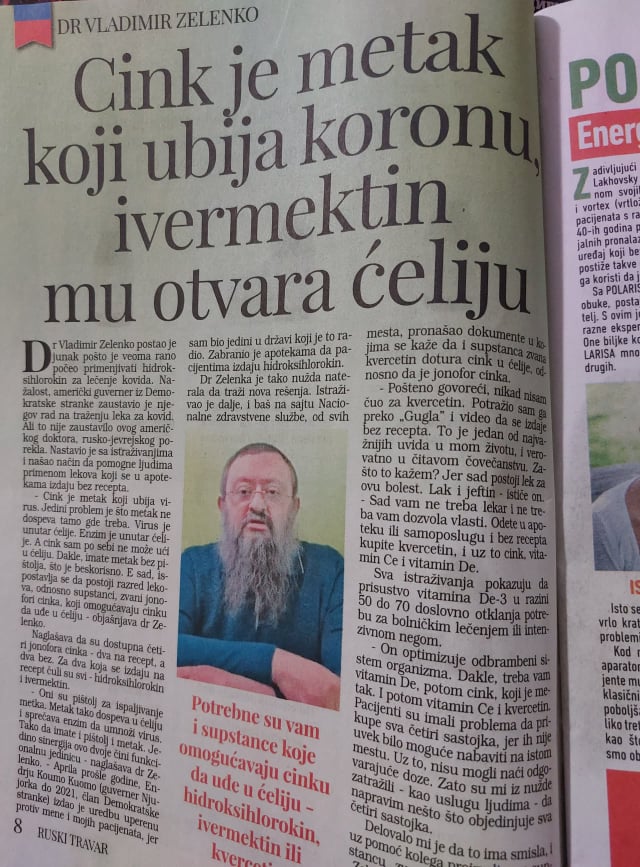
Dr Vladimir Zelenko’s treatment protocol is often promoted by anti-vaxxers as a “miracle cure” for the coronavirus. “Truthmeter” has already written about Dr Zelenko’s drug and the disinformation he places – that the combination of hydroxychloroquine, zinc and azithromycin is magical and cures Covid-19.
Suspicious ads
The commercial pages of these magazines are filled with advertisements from various local and regional fortune-tellers and healers offering horoscope consultations or promising miraculous remedies. So, for example, when you open the magazine “Russian Doctor”, the first thing you will see is a certain “Doctor Cvetin” who “cures cancer and leukemia” and other “most severe chronic incurable diseases” with the help of his “Uni-lek-1” for which he says “does not just cure death”. Doctor Cvetin, who claims to be the “No. 1 Doctor in the Balkans”, runs “the first internet neuropathic clinic for space medicine in the Balkans”. He says that “in cooperation with a Russian colleague” he diagnoses diseases through Viber or WhatsApp.
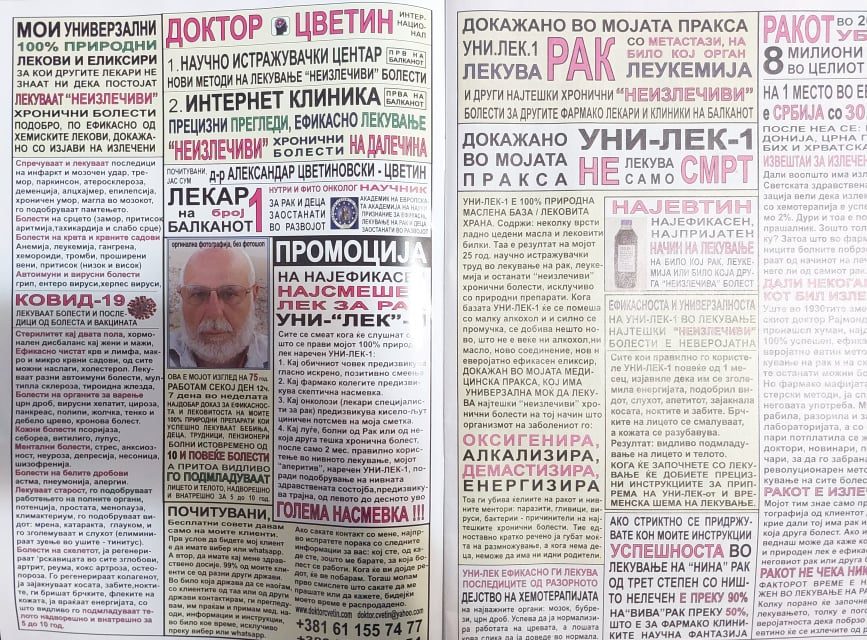
There are other ads in the magazine that contain terms that sound scientific but have nothing to do with medicine. Thus, terms such as “information therapy”, and “quantum medicine” are mentioned by people in white coats or with titles from “academies” – companies that are neither scientific nor medical institutions.
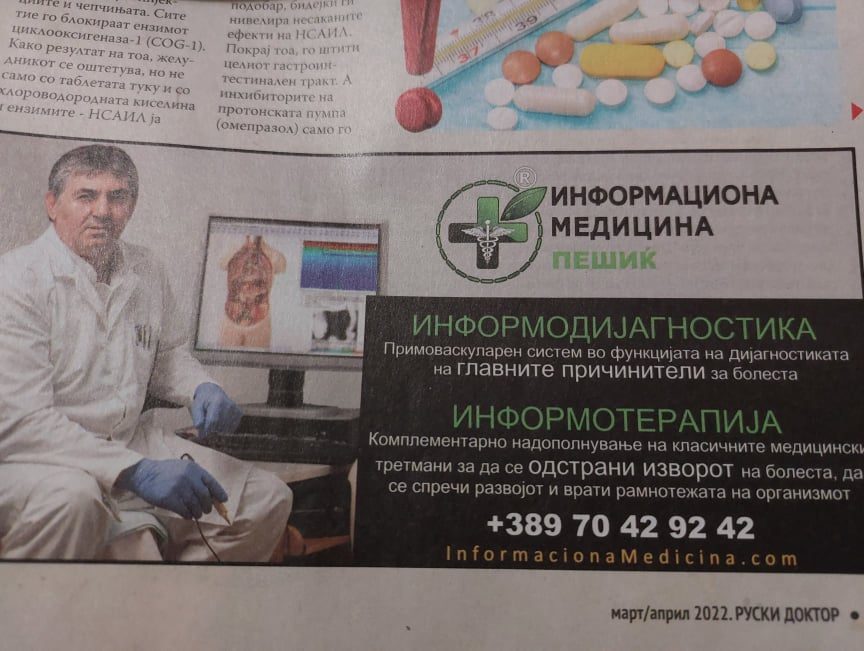
The suspicion of the credibility of the advertisements is confirmed by the fact that the newspaper has repeated the following “information plus” twice on the third page, which reads that the publisher “Color Media Plus” and the editorial office “are not responsible for the content and truthfulness of advertisements, advertisements and promotions.”
The same is written on the last page of the magazine “Russian medicine”, but in the Serbian language.
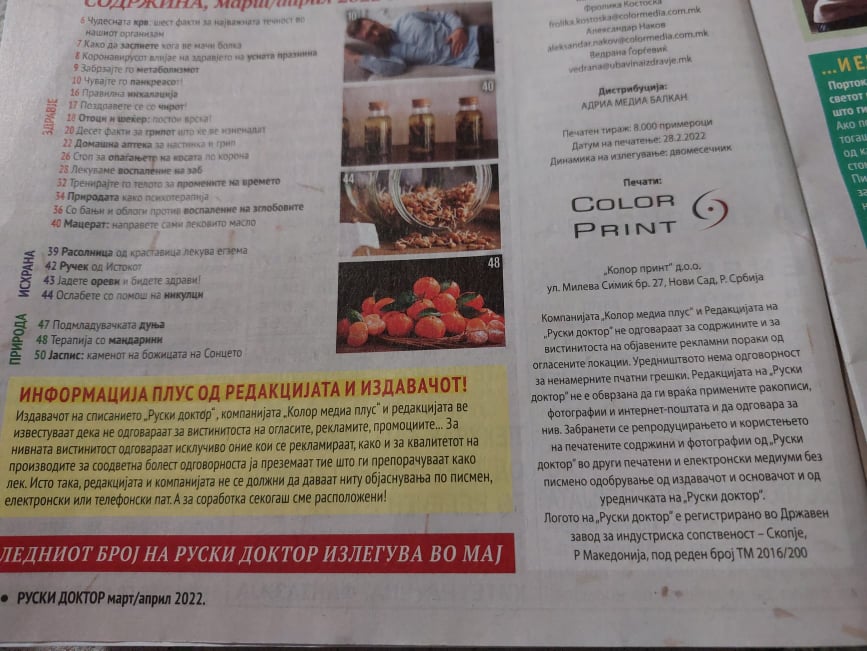
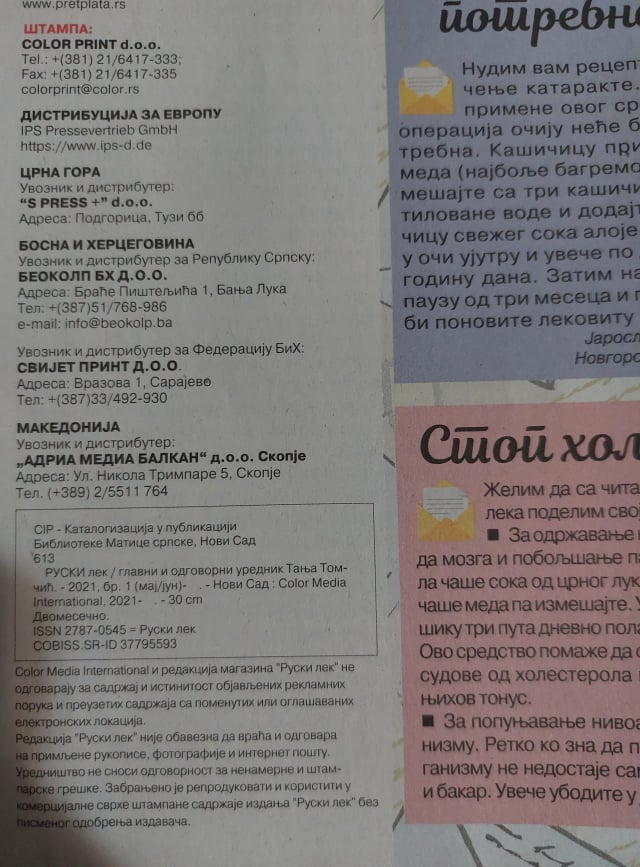
In this way, the publisher of the magazines tries to legally distance itself from court proceedings, emphasizing that:
Only those who advertise are responsible for the authenticity, as well as those who recommend them as a medicine take responsibility for the quality of the appropriate disease products. Also, the editorial office and the company are not obliged to give explanations in writing, electronically or by telephone.
“Russian Herbalist”, on the other hand, warns readers that “the texts are for informational purposes only and should not be accepted as a substitute for the therapy and medicines prescribed by your doctor.”
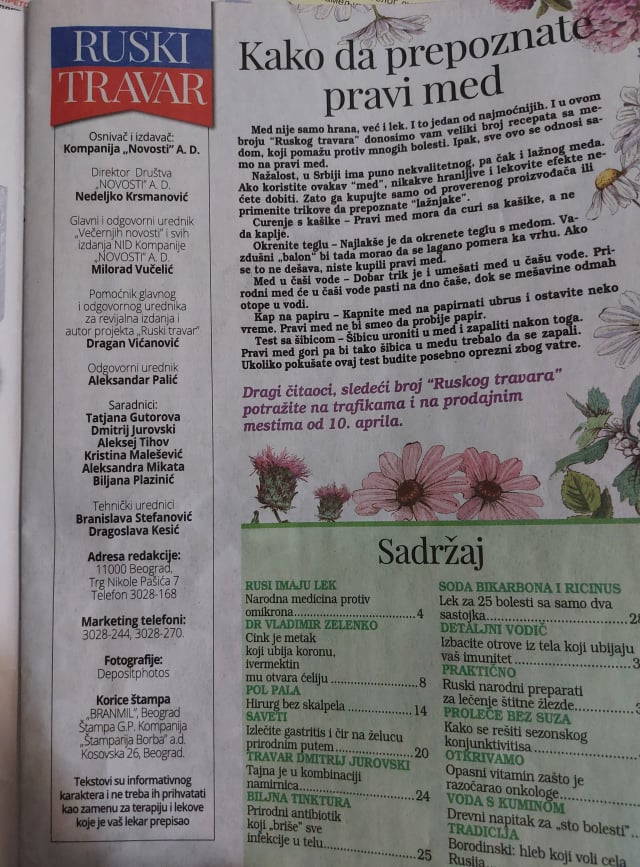
Russian health and Russian longevity propaganda
What is interesting is that these magazines emphasize Russian health, Russian medicine, Russian drugs and of course Russian longevity. So in “Russian Doctor” from the section “Russia with Love”, readers are offered the secret of longevity of the people of the Caucasus. The text presents people who lived over 100 years, and some of them entered the Russian record book. The women featured in this text “never went to the doctor, worked on the farms alone, and gave birth to children at home, not in a maternity hospital.”
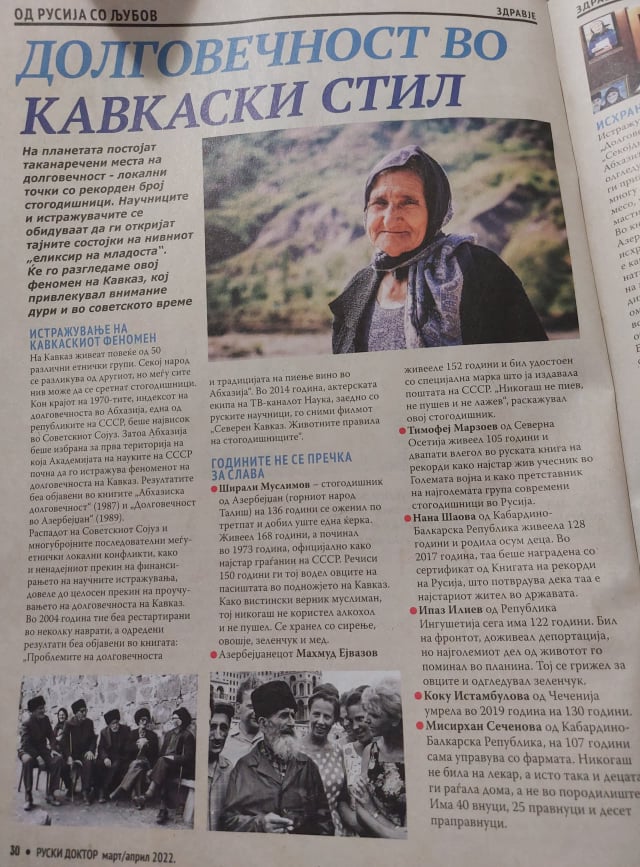
But despite trying to paint a picture of a country with excellent health, data from relevant institutions show that Russia has one of the worst statistics in this area. Life expectancy there is significantly lower than in developed countries.
According to the World Bank, in 2016, the average life expectancy in Russia was 71.6 years, compared to 82.3 years in France and 83.9 years in Japan – which is over 12 years more than in Russia.
A medical study conducted in 2014 showed that the probability of a man in Russia dying before his 55th birthday is 25 percent, due to two factors: alcoholism as the main cause and smoking as the secondary.
Balkan countries, including N. Macedonia and Serbia, also lag behind the European Union in terms of health promotion but are still much better than Russia.
According to the above data from the World Bank from 2016, in Serbia, the average life expectancy was 75.2 years, and our the country the situation is slightly better – 75.7 years. The countries of the former Yugoslavia that joined the EU have an even better situation – in Croatia, the average life expectancy is 78 years, and in Slovenia 80.8 years, i.e. nine years longer than in Russia.




















![Young people in a three-day-workshop learned about data visualization [Gallery]](https://meta.mk/wp-content/uploads/2023/12/obuka-za-vizuelizacija-na-podatoci-vo-dekemvri-2023--100x70.jpg)




